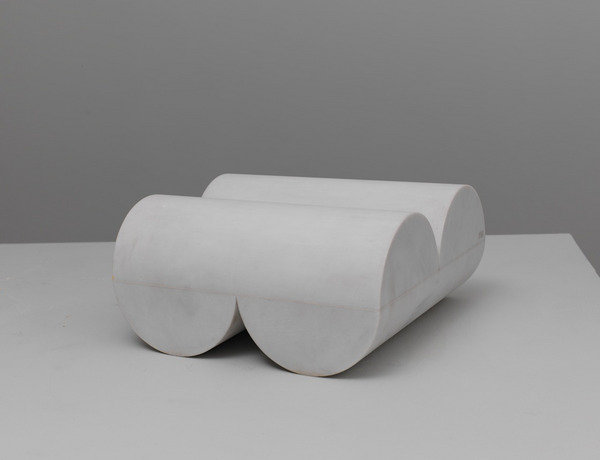Two Exhibitions
dal 21/5/2015 al 3/7/2015
Segnalato da
21/5/2015
Two Exhibitions
Lisson Gallery, London
Through painting, drawing and sculpture,Shirazeh Houshiary approaches the intangible and evanescent, articulating a metaphysical reality that lies beyond mere form and surface. Sergio Camargo gained renown for his modular geometric constructions, assembled from cuboid and cylindrical forms in wood, terracotta, stone and marble.

Shirazeh Houshiary: Smell of First Snow
Cross-sensory perception quickens and multiplies in Smell of First Snow, Shirazeh
Houshiary’s eighth exhibition at Lisson Gallery. Through painting, drawing and
sculpture, Houshiary approaches the intangible and evanescent, articulating a
metaphysical reality that lies beyond mere form and surface.
A diaphanous mesh of pencilled words traces its way across Houshiary’s canvases like
spiralling strands of DNA. Each word is precisely written yet cumulatively becomes
illegible, individual meanings giving way to vibrations that invoke a plethora of non-
verbal associations. Migratory currents, the minute structures of living matter, shifting
atmospheres and the whorls of fingerprints are simultaneously summoned in the
written topographies that swirl and crystallise across the picture surface, conveying
turbulent energies and the processes of the universe.
In the vast central diptych, A Deluge (2015), a tissue formed of innumerable tiny
words and powdered cobalt and violet pigments form a fine tracery evocative of the
muted luminosity of a clouded sky. The monumental structure of the image,
immersing the viewer in its sea of meticulously organised atoms, is near symmetrical
while suggesting endless flux. Telescoping biological and cosmic scales, it grants a
glimpse of infinity within the limits of its dual panels.
Smaller works such as Zero and Seed (both 2014) likewise evince a protean energy.
Proceeding from the binary starting point of a black or white aquacryl ground, these
paintings possess a numinous quality, their teeming eddies of words being inscribed
with precision yet feeling as though they arrived pre-formed — as organic as
language, as effortless and essential as breath. Describing what is known rather than
seen, felt via overlapping senses and via memory, Houshiary’s canvases are
manifestations of mindfulness in which the artist’s touch translates into being.
Accompanying the paintings are sculptures made this year. Two wall-based works,
Allegory of Sight and Allegory of Sound, explicitly strive after synaesthesia. Resembling
dancing ribbons or darting wavelengths, these cast stainless steel sculptures are
coated in dense black and evanescent white paint respectively, creating a dialectical
evocation of these vital senses. Lit from above and attached to the wall, they traverse
not only between two- and three-dimensionality, but also between the physical and
immaterial worlds, throwing shadows whose echoing delineations form a
continuation of the works.
----
Sergio Camargo: Mármore
“Perhaps innate, these structures derive from their own anteriorities or interiorities,
however you wish... They are only what they know how to be.” Sergio Camargo
Lisson Gallery presents a solo show of Brazilian sculptor Sergio Camargo (1930-90),
his first in London for over 30 years. Best known in his own country and
internationally for wall-based reliefs, public sculptures and architectural commissions,
this exhibition focuses on Camargo’s works in white and black marble (mármore),
including small-scale tabletop works and large freestanding pieces. Simultaneously
exploring rationality and chaos, his characteristic three-dimensional constructions of
geometric shapes are governed by a self-imposed rigour in regards to colour,
material and form. Although distinctly minimalist in order and means, these elegant
objects – assembled from cylindrical, cuboid and ovoid motifs – are equally generous
and expansive in their study of volume, light and space.
Camargo worked with master craftsmen in France and Italy to achieve his desired
effects in marble, employing the contrasting shades of either the milky-white, un-
veined Carrara or the pitch-black Belgian stone. Despite Camargo’s conceptual and
geometric precision – progressing from idea to drawing, then from maquette to the
final work – there are obvious organic qualities to the repeating, projecting forms,
including undulating and serpentine wave-like curves, as well as the bodily lean
encountered in a tall upright structure. Even the elegantly terraced, planar façades of
the architectonic pieces suggest an inherent rhythm or an internal cadence to the
marble works that belies their solid, polished exteriors.
Artistically, Camargo has often been linked with either the Neo-Concrete
constructivism or Op Art kineticism of Brazilian colleagues such as Lygia Clark, Mira
Schendel and Hélio Oiticica (a trio he introduced to Signals Gallery in London, after
he showed there himself in 1964), but he was never clearly aligned with any one
movement. Consequently, Camargo stands apart from many of his contemporaries,
although he found a kindred spirit and a frequent collaborator in the father figure of
Brazilian modernist architecture, Oscar Niemeyer – for whose Foreign Ministry
building in Brasília (1965-67) he produced a 25-metre long wall composed of jagged,
angular protrusions. Camargo made connections beyond Brazil early on in his career,
encountering the likes of Lucio Fontana, Constantin Brancusi, Hans Arp and Henri
Laurens among others, while internationally his pared-down practice mirrored those
of Sol LeWitt and Robert Ryman in America.
This exhibition has been conceived in association with the artist’s estate and Galeria
Raquel Arnaud, São Paulo.
Image: Sergio Camargo: Mármore
Press Contact:
Diana Babei or Gair Burton at Rhiannon Pickles PR
Tel: +44 (0)7789 868 991
Email: diana@picklespr.com, gair@picklespr.com
Opening: Friday 22 May 2015
Lisson Gallery | London
27 & 52-54 Bell Street
Mon - Fri 10am to 6pm, Sat 11am to 5pm



